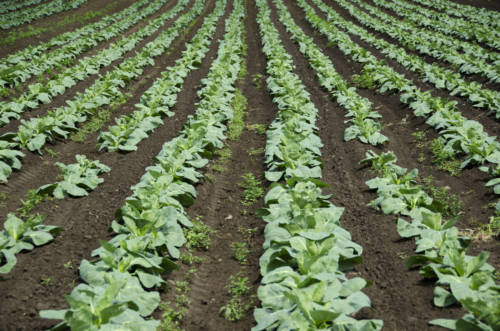Edible Schoolyard NYC Presents: Principals Making A Difference
“Stories From The Ground” is an ongoing Edible Schoolyard NYC series that spotlights the people, places, and personalities behind ESNYC’s mission to make nourishing, healthy food more accessible to children in New York City. The GC Team are huge supporters of ESNYC, and together we are working to educate, advocate, and support the community members who play a role in making this vision a reality. Below, ESNYC interviews two principals whose work in East Harlem is making a difference in our community.
The Principals
In East Harlem, two schools share the space in which we teach garden and kitchen classes, and we spoke with the principals of both schools about their experiences with this work. Dr. Jacqueline Pryce-Harvey leads P.S./M.S. 7, an elementary and middle school, and Mr. David Baiz heads up Global Technology Preparatory, the middle school that the two helped found eight years ago. Before opening Global Tech, they were co-teachers at a school in the Bronx, and in 2014, Dr. Pryce-Harvey was tapped to be principal of P.S./M.S. 7. Interview has been edited for length and brevity.
Edible Schoolyard NYC: What are some of the differences that you’ve noticed between the community where you taught in the Bronx and this one in East Harlem?
Dr. Pryce-Harvey: Well they’re very similar in socioeconomic [terms]. But when you get to East Harlem there’s a lot of generational poverty built in, with projects running from 96th Street down to Madison Park. Kids here are very, very aware of their legal, social rights. Parents in the Bronx school were not such activists [as they were here]. Over time, we have gotten to know the community, we understand their strengths, we work on the strengths, we build on the strengths. And that’s what Edible Schoolyard helps us to do, to build on those strengths.
ESYNYC: What are some of those strengths?
Dr. P: The family connections. Especially in this school, we have parents whose grandkids are here and they came to this school, so they’re very committed.
Mr. Baiz: I would echo that in Global Tech as well. I mean, we’re now at a point where we’re in the eighth year of the school, and at first we had a real challenge getting families to buy into the vision of the school and the vision of the programming that we do here. And I think now we’re at a place where the families trust us. Families are [often] told one thing, especially from government agencies, unfortunately, and we represent a government agency, but then are delivered another.
Dr. P: What I find really interesting is that people are telling me, “Oh, I was at the hairdresser, and somebody said to me, ‘Oh, my child is at P.S. 7, and it’s the best school.’” So the word is out on the street and that’s very encouraging. Our numbers are up 4% this year. A strength of the community is that once they trust you and believe in you they don’t want to go anywhere else. Because they have to feel supported and comfortable in the environment.
“I think we’re just at the tip of the iceberg of where we can go with this.”
ESYNYC: What do you think is the importance of this program for your students?
Dr. P: Health is the most important thing. I mean, when you start getting older you really begin to understand that. But if you can instill that feeling and that concept very young, it becomes a part of who they are. If you don’t have your health, you have nothing. All this education is going nowhere. Food is a big idea, a big big idea, and we take it for granted. These students start very early making food a central part of their thinking, not just food as something for pleasure but also for their health, and to nourish their bodies for fuel and for work. We’re starting to say “Ok, your body needs fuel for work.” My job always — i just had a talk with the sixth graders — is “You’re here to work.” That’s the bottom line, and work is empowering.
Mr. B: It’s part of what we do as teachers, you have to make sure our students are fed. Because often they’re not even getting to school with anything in their stomach. So that’s one piece that I know Jackie’s always been sensitive to and responds to. In terms of the work here, I see it as an empowerment issue, and I also see it as social justice. It’s a way of saying “we value you as a community, and we know that it’s important to be healthy, and we want to make sure you have options.” I mean, you can still make choices, everyone makes choices, but if you don’t have options there is no choice. And going into communities like East Harlem where it feels like there’s a real lack of options when it comes to healthy eating, that means we don’t value you. So this really becomes a larger social justice issue because you’re giving people — our students, our families, and the community — the education to make these choices and the options to make these choices.
“I see it as an empowerment issue, and I also see it as social justice.”
ESYNYC: Are you seeing any specific examples of how students and/or parents are responding to this program?
Mr. B: Yeah, I mean, our Global Tech eighth graders help with the farmstand every Wednesday, and they’re so thrilled to be out there working with the community, selling produce. I mean to go from a sixth grader where they’re like, “I don’t know about this,” to eighth grade being now active in the community, really demonstrates that. Another is the parents — it’s now becoming part of the culture of the PTA meetings to have salads. There’s still hesitation when there’s a new parent, like “Why are we having salad?” But then you overhear parents going, “No, this is really good, you should try this.” That positive pressure and hearing it coming from within the community, when it’s parent to parent, that’s a real shift in the culture of the families and how they’re responding to the work that you’re doing.
Dr. P: What we don’t realize is these kids had no idea where food came from. And I think we’re just at the tip of the iceberg of where we can go with this. Whenever I go into a classroom I ask students an informal survey — the garden is always number one. Followed by chocolate milk. I do these informal surveys all the time just to keep a pulse of what the kids are excited about. And they want to garden more times than once or twice a month, they want to garden more, that’s one of the big requests. And this is from all the classes, all the grades.
Mr. B: I see it, too. Every two to three years the school has to be reviewed, and I brought the reviewer to the kitchen classroom. I could tell that she was just super impressed with the work. You had [a student] giving her a tour of the new greenhouse and he was like, “Oh, we’re growing these through asexual reproduction.” And she’s like “What?” And he’s like “Asexual reproduction, yeah. That means you just take it from the plant and then you plant it again, and still use the same part of the plant.” And she’s like “Ok, thank you.” It was great to see it through her eyes, to see her just taken aback by what has now become normalized in our school. It was a good refresher and a reminder that this is powerful work.
This article originally appeared on Edible Schoolyard NYC’s website, and has been reproduced and shared here with permission.





































